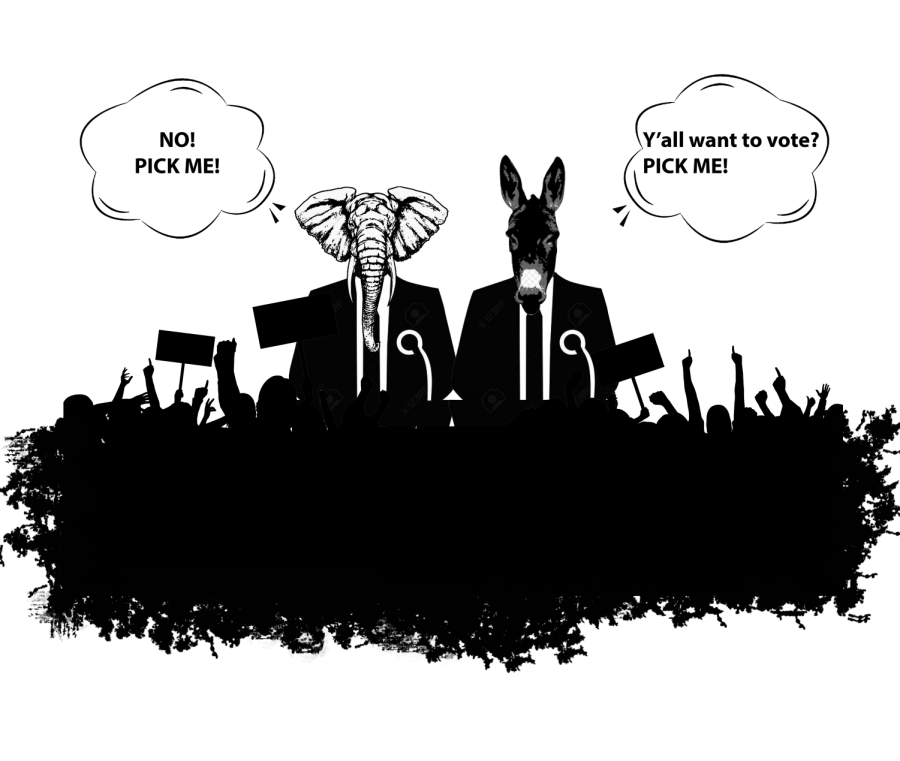Buening: Toxic Communication Equals a Toxic Political Environment
November 19, 2021
I’m an opinionated person. If you are too, you understand the uncomfortable situations being opinionated can land you in. Maybe you also anticipate a loaded Thanksgiving dinner debate with extended relatives. One misplaced word can spur an immediate, explosive response. But this form of discourse achieves nothing.
The way we articulate our opinions can greatly impact the way people receive them. And our communication techniques dictate how people perceive us. Because of this, we should choose our words carefully when we engage in delicate conversations.
But this principle doesn’t only apply within personal spheres. Deliberate political communication strategies greatly influence how we perceive truth. And as we’ve seen in recent years, political debates have become laden with polarizing political jargon.
Our country has nourished an extremely toxic political environment. Operating from informed decisions requires that we hold leaders and organizations accountable for misinformation campaigns and unproductive rhetoric.
What Are Buzzwords?
A buzzword is defined as “an important-sounding usually technical word or phrase often of little meaning used chiefly to impress laymen.” Essentially, the overuse of certain terms effectively renders them meaningless.
In an email interview Kevin Coe, professor in the University of Utah’s communications department, helped contextualize the role of buzzwords in influencing political attitudes.
Buzzwords adopt loaded connotations that often have little to do with their actual definitions. Professor Coe explained that these connotations are developed “through concerted effort by those invested in a certain political outcome.” Since “the words we use make certain actions more or less likely,” buzzwords work as a powerful — albeit dangerous — tool for political leaders and strategists.
But we see these words constantly appear within political discourse. The turbulent debate around critical race theory (CRT) provides us with a current example. Across the country, some parents have expressed contempt for CRT in school board meetings. In response, Equity, Diversity and Inclusion Committee Chair Stephanie Walker said that CRT is “firing up people and it’s based on things that aren’t true.”
The debate has become so politically charged that most participants don’t know what the theory entails or what it actually means. Coe said CRT has “become a political target, even though most who are targeting it have never encountered it, will never encounter it, and have no idea what it actually is.”
Critical race theory isn’t the only buzzword circulating our conversations. People frequently throw around terms they don’t know in debates about unrelated topics. For instance, at least 20% of Americans admit they can’t define socialism, but it has become a popular political accusation. People label anything surrounding liberal ideology as “Marxist.” This kind of labeling represents a lack of understanding of the political spectrum.
Dog-Whistles
Politicized jargon isn’t the only tool politicians weaponize. Recently I had the opportunity to listen to Professor Ian Haney López from the University of California, Berkeley. He discussed dog-whistle politics, exposing how race has been used as a political weapon on behalf of politicians since the Civil Rights Movement. In his book, “Dog Whistle Politics: How Coded Racial Appeals Have Reinvented Racism & Wrecked the Middle Class,” he elaborates on how politicians used political appeals to persuade white voters to support policies against their own interests.
Racial “dog-whistles,” as Lopez defined them, are “political catchphrases that don’t explicitly mention race but are ultimately used to refer to people of color and the various threats they apparently command.” For example, the phrase “war on terror” may insinuate biased resentment toward people of Arab and Muslim descent.
Subtlety, as Professor Coe described, characterizes dog-whistle politics. However, as our political climate becomes more toxic, bigotry becomes less subtle. “What is striking about the current U.S. political climate is how overt racist language has become,” Coe said, “Fear appeals, especially fear appeals based on racism and xenophobia, continue to be tragically common.” Bigotry and unfounded fear appeals should not characterize American politics. We’ve seen what consequences arise when they do.
Systemic Misinformation
The prevalence of blatant bigotry and buzzwords has made us susceptible to misinformation. The U.S. is particularly plagued by misinformation campaigns to which citizens show adamant allegiance. The politicization of scientific truths behind vaccinations and climate change demonstrates the harmful effects of buzzwords.
Misinformation seems nearly impossible to battle at times. Despite our best efforts to differentiate between genuine and misleading political discourses, we can’t control what information politicians or interest groups promote. For this reason, Coe described misinformation as a “system-level problem” that “will require system-level solutions to fix.”
So, what does this mean? “We need to stop pretending that individual-level solutions can fix the problem of misinformation,” said Professor Coe. “When you have people in positions of power deeply invested in spreading misinformation and organizations interested more in making money than protecting democracy, you have a recipe for disaster.”
Our government’s leaders cannot operate from disingenuous interests. We need to vote out politicians that utilize manipulative communication tactics and hold organizations accountable for their own disinformation campaigns. As long as we let toxic communication define political discourse, we will only prolong meaningful change.
While we need to proceed with caution and do our best to avoid political manipulation, that greater change is necessary. We can’t reach informed conclusions when we aren’t operating from the same pool of facts.









John Hedberg • Nov 25, 2021 at 6:25 am
This article itself is a good example of buzzwords (“dogwhistles” & “misinformation”) and why it’s important that we all have the freedom to contribute our own individual additions to the “pool of facts”. If one party (say, the Stazi of old East Germany, during the Cold War period) has exclusive control of what is allowed into the “pool of facts”, they can control public decisions, because they effectively control public perception. If you don’t know about your choices, or are never told you have one, control becomes a simple matter for Big Brother. All he has to do is label any opponent an enemy of democracy, allude a few false attributes to that opponent to make them appear evil and socially “radioactive”, and no one will dare open their mouth to oppose the champions of “compassion” (i.e. if you oppose “us”, you really hate people. It’s not because our policies are stupid or harmful that you voice any objection, it’s because YOU’RE stupid and harmful! Therefore, no one has to listen to you, and everyone can dehumanize you, in the name of “compassion”, because you’ve been falsely defamed as having evil hatreds you never possessed. Clever way to disarm any opponent, right? What good person is against compassion?)
If any group expresses the need to censor or control public debate, it’s because they know their ideas will be unpopular, so the only way they can survive is to limit the “pool of facts” and demonize all their opponents as “threats to democracy” and “haters”, all of which hide how destructive their real agenda actually is, once it’s implemented in current places like Venezuela, where one of the world’s richest breadbaskets can no longer keep its people from starving, or places like China, Russia, and Cambodia, where “cultural revolutions” “cleansed” their cultures’ “pool of facts”, resulting in the arrest and murder of millions and millions of innocent people all through the 20th Century, just so the objection to prevailing truth could be silenced and power maintained in the name of figment “compassion”.
Any program or dogma which teaches people that some are born oppressors and some oppressed, based on the skin color we are born with, our gender, or other inherent identifiers, are really teaching Jim Crow racism under a new name, whether you call it “CRT”, “Anti-Racism”, or “Equity-Diversity & Inclusion”. It’s not very equitable or inclusive of diversity if it teaches people that their worth is greater or less based on characteristics they cannot change, and that some are born evil, when in fact we’re all just as human in our weaknesses as well as our ability to tame them as individuals. Call it Socialism, Marxism, or Jim Crow, if it teaches people to place worth in something other than our common humanity, it teaches partiality (prejudice) and hate, rather than Love, appreciation, wonder, courage, and real compassion, which are all as human and individual as our weaknesses, and are all based on our choices in the face of a life where suffering is a guarantee, as is our ability to make beauty happen in the midst of it, and to appreciate wonder and truth to help us overcome inevitable suffering in all the places these reside, all around us, all the time, if we’re willing (if we choose) to open our eyes and, as individuals, tame the content of our characters so that what we express is the closest to Love that we can aspire to.
Teaching people racism (that people can be defined by shades of skin pigmentation) as a way to combat racism is like teaching a cheerleader (of any gender) that the only way they can preserve their virginity is to sleep with the entire football team. It could be a little self-defeating! And so it is with those who wish to censor the “pool of facts” while they teach us to fear and hate each other based on things we can never change, in the name of opposing fear and hate, while they divide and exclude us by how we identify, in the name of diversity and inclusion. What could possibly go wrong that didn’t go wrong in all the other countries which tried the same cultural revolution which compassionately buried millions of our innocent neighbors and family members? What’s in a name?
Best, With Love,
J Hedberg
patrick shea • Nov 23, 2021 at 12:29 pm
I have run for public office two times, first for Governor of Utah (voters did not think an Irish Catholic Governor would represent them well), and second for the U.S. Senate in 1994 against Sen. Orrin Hatch. The latter campaign happened for two reason, no one was going to run against Hatch, and there was always a chance would get hit by a meteor, something I did not want to happen.
From my candidate experience two observations. Money has ruined our election system. In 1968 I ran a campaign for a candidate for Attorney General. We spent the whopping some of $75,000. The same race today in Utah would cost nearly $2,000,000. So why the inflation? Political consultants. They get a percentage of the money raised and they have recovered the age old reality of politics. That is, fear and hatred motivate people to vote, much more than positive aspirations or community building.
We, the citizens, should pay for public campaigns so candidates don’t have grovel to monied interest.